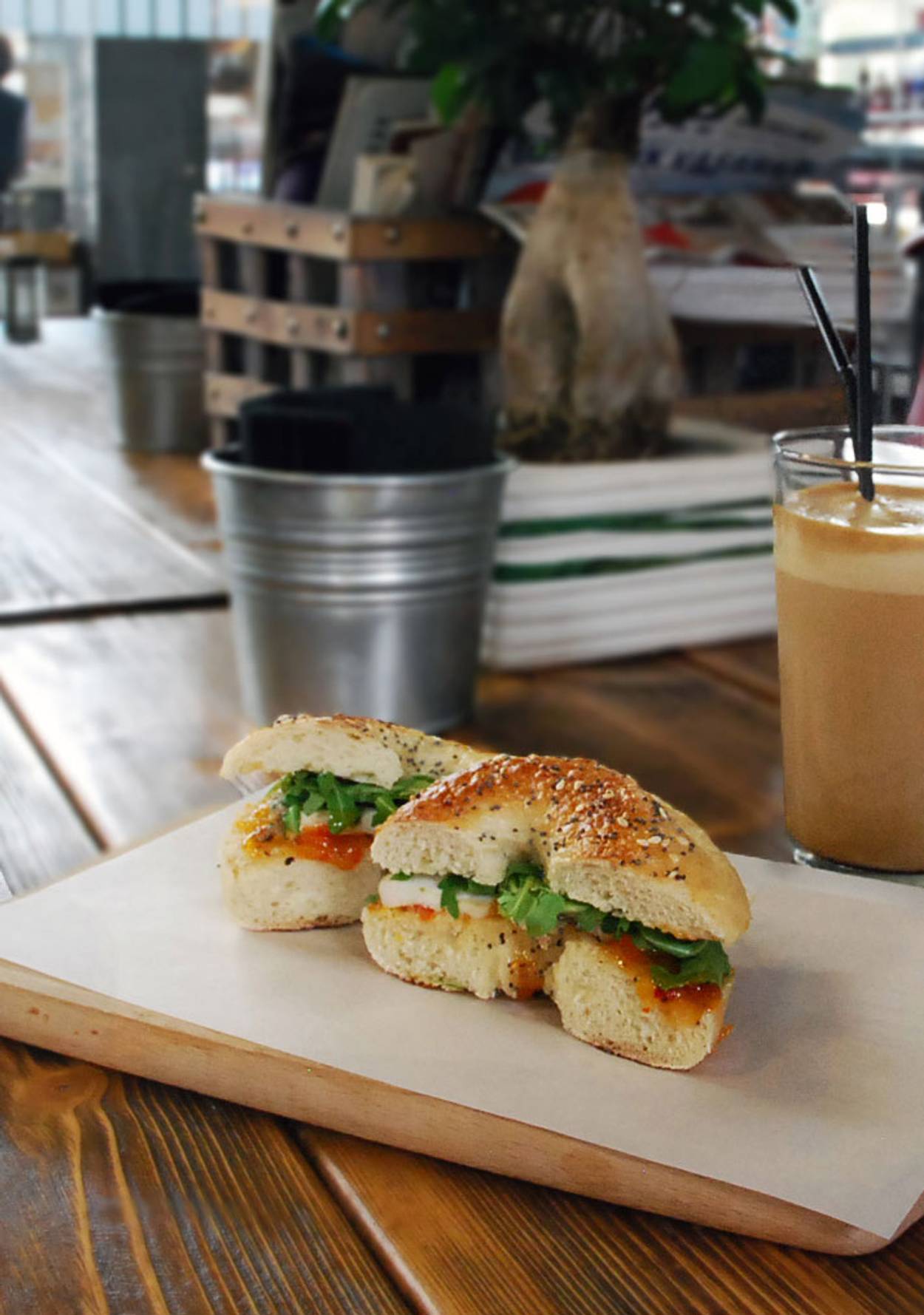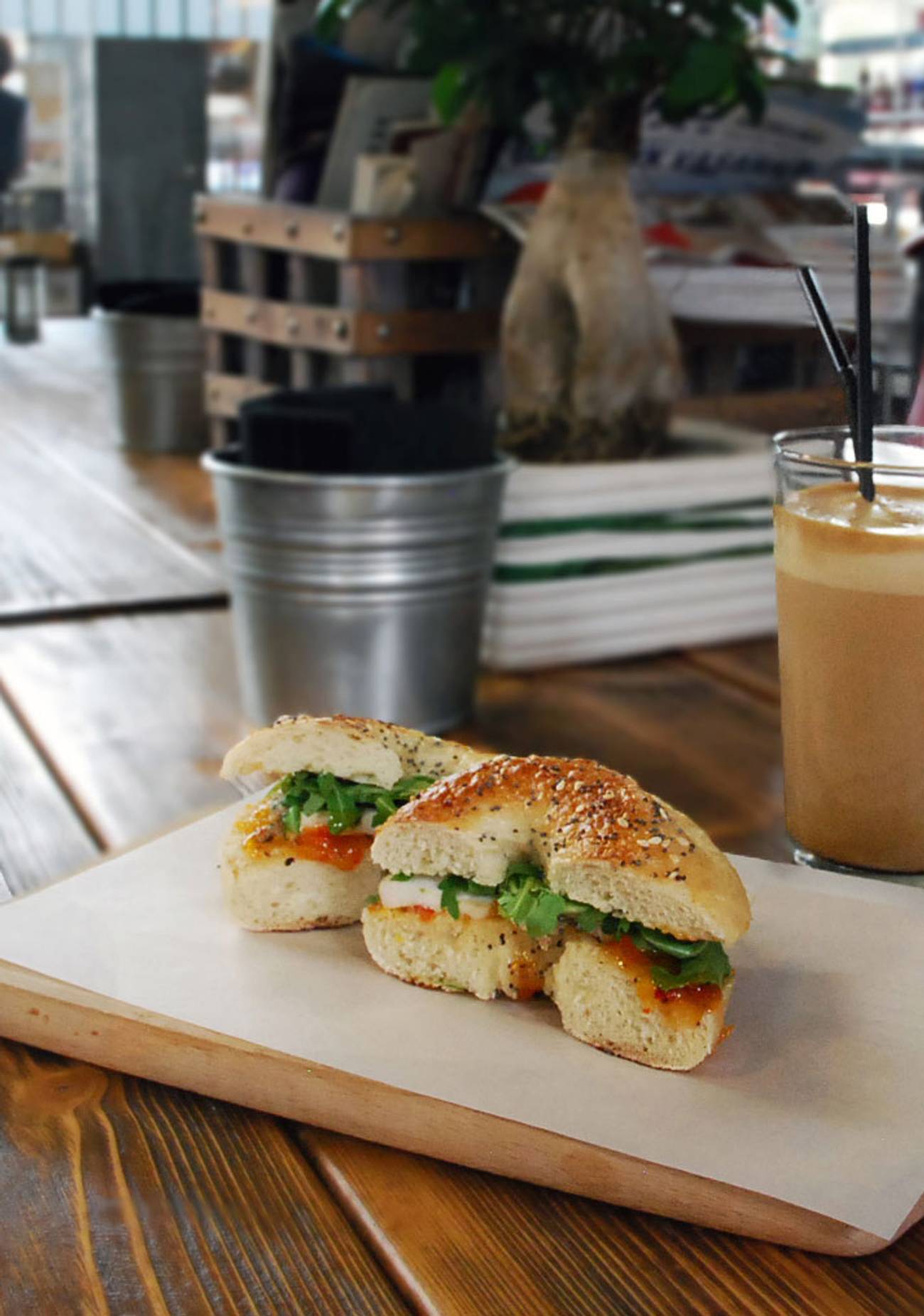Bringing Bagels Back to Vilnius
After a long absence, the Jewish staple has returned to the Lithuanian capital




Most food historians place the origin of the bagel somewhere vaguely in the Jewish alleys of the Polish-Lithuanian Commonwealth. In those days in Lithuania’s capital, Vilnius—also known as Vilna, the city once dubbed the “Jerusalem of the North”—bagels were ubiquitous, sold on the streets, and in the bakeries and markets. In modern times, however, the bagel had all but been erased from popular memory. Until now.
For centuries, the city’s Old Town was home to a thriving community of Litvaks, as local Jews referred to themselves. The district was lauded for its cultured elite and a Great Synagogue that attracted scholars from all over Europe. All that changed with the Holocaust, during which 95% of Lithuanian Jews were deported and murdered. Now, all that remains in the Old Town are monuments to what once was: street signs in Yiddish, inscriptions educating about the ghetto, a bust of the famed intellectual Vilna Gaon.
As the Jews disappeared from Vilnius, so did popular knowledge of the bagel. For over 70 years, this once-loved snack was nothing but a vague memory in fading recollections of the elderly. As one local recalled of his childhood in Telšiai, as reported by the Jewish Community of Lithuania: “There will never again be the kind of bagels I ate every day in my childhood. I remember the hot bagels. That smell, the deliciousness, the crunchiness, and when I used to spread butter on it, it’s indescribable.”
So it was quite a surprise when, seemingly from nowhere, bagels started to come back to Vilnius’ Old Town—in a big way.
In 2010, two Fulbright students reintroduced the yeasty treat to the public in a spur-of-the-moment bagel revivification. The Vilnius Bagel Project, as it was known, was a small but successful one-day event in Vilnius’ Old Town where bagels were served to 200 curious locals. From there, bagels began to slowly appear in the glass boxes of corner bakeries and hipster cafés. Interest peaked with the opening of two bagel-dedicated shops in Old Town: Beigelistai and Beigelių Krautuvėlė.
Tucked away on a corner of Literatu Street, Beigelistai has become a favorite landmark of the Old Town in just a few years. The founder, Nomeda Kuodiene, was inspired to open up her bagel shop in 2014 when she had a chance to sample sumptuous bagels during her travels to New York. It seemed paradoxical that in order to indulge in their goodness, she had to travel so far from the bagel’s homeland.
“I thought, how come nobody does them in Lithuania?” Kuodiene said. “They’re very popular all over the world and you can’t even find them in their native surroundings.” At first, Beigelistai’s customers tended to be local Jewish youths, familiar with bagels from their trips overseas, as well as the elderly population who still recalled bagels from their youth pre-WWII.
“As they say,” Kuodiene recalled, “there were once plenty of bagel shops in every big and little town in Lithuania, every fair was full of them, or Jewish friends made them at home.”
As business soared, and public interest grew, Jewish locals and tourists alike flocked to the tasty bagel brunches at Beigelistai. They even opened up a second location in the indoor market Halės Turgus. It’s not uncommon for customers to ask about the origin of the bagel and its many recipes. Tourists on the “Jewish Vilnius” excursion often end their tour at Beigelistai, where staff educate them on the history and give out samples. All in all, bagels in Vilnius have acquired a reputation as a tasty and balanced brunch item, with origins in Jewish cuisine. The cafe’s top seller remains the classic cream cheese and lox, topped with red onions and capers. But Beigelistai isn’t afraid to experiment with vegan options, braised beef, tuna salad, cured ham and fig jam, and seasonal specialties like braised turkey with cranberry jam and pear.
One patron of Beigelistai I spoke with, a Vilnius native named Tamara, sees the bagels as a nice way to keep the city’s history alive. “A hundred years ago, it was a usual snack you could find around the corner in old Vilnius,” she said. “So beyond the great taste, bagels are also a fragile link with our history from long ago. I cannot think of a better morning than having a cup of coffee and a bagel in the heart of Vilnius’ downtown.”
The second major player of bagels in Lithuania is Beigelių Krautuvėlė, the Bagel Shop, founded in 2016 by the Lithuanian Jewish Community.
Established as a social project to promote tolerance and local Litvak culture, the shop has gone on to become a popular gathering place for the neighborhood. “It became the heart of the community,” cafe director Dovilė Rūkaitė said, “where you can meet people, where you can talk in different languages, where everybody is welcome.” Though the café prepares a variety of kosher foods and traditional sweets, their main attraction remains the bagel. The shop’s logo even depicts six bagels side by side.
“Students come over to grab bagels, hipsters are coming to check what’s cooking in our kitchen,” Rūkaitė explained. The shop is especially busy during summer, when the tourist season attracts people from all over the world, from Israel—drawn to the kosher cooking—as well as Litvaks from New Zealand, Australia, the United States, Canada, and elsewhere.
“I remember when one sister and two brothers met in the shop,” Rūkaitė recalled. “One from a southern city in Lithuania, one from New York, another from Jerusalem. They all came to Vilnius in one day and they all went to our bakery. There was also one lady from France, in her 90s. Her grandchild brought her to our bagel shop to try a special sweet called imberlach made from carrot and ginger. First she started to talk Yiddish but then she started to cry, because the food was exactly like her grandma made. So it’s a mix of good food, nostalgia and memories, and lost Jewish culture.”
With only five tables, it’s no surprise that the café encourages such an intimate atmosphere, no matter your background or creed. As with Beigelistai, the café claims the classic lox, cream cheese, red onion, and capers is the bestseller. Occasionally, an American will walk in with the curious request of an omelette in a bagel. Other menu items that are always a hit are the cinnamon buns, shakshuka, latkes, teiglach,and, on special occasions, sufganiyot. There’s also gefilte fish, uniquely peppered in this region. And every Friday, you can expect hot kosher challah, fresh from the oven. To ensure that the food remains kosher, cooking is overseen by a mashgiach appointed by the local rabbi.
Remigijus Pielikis, a local guide who runs tours in Vilnius, said bagels are a part of the city’s history: “From a local’s point of view, I think it’s good that we can remember what was lost for a while. Vilnius is a multicultural city, so it’s one of the ways to learn about different cultures. In our days, a lot of people know bagels from New York or London, but they’re surprised to hear that it started very close to us—they were popular in our country before they became popular worldwide.”
It’s a history that’s come home. “We are trying to bring the story back,” Rūkaitė explained. “People recognize bagels as a Jewish food because they learn from us. We’re not only cooking the food, we’re also telling the story. And today, it’s finally accepted that bagels are back where they belong.”
Wailana Kalama is a travel and science writer from Hawaii, now living in Lithuania. Her works have appeared in BBC Travel, Lonely Planet, and Hakai Magazine, among others.